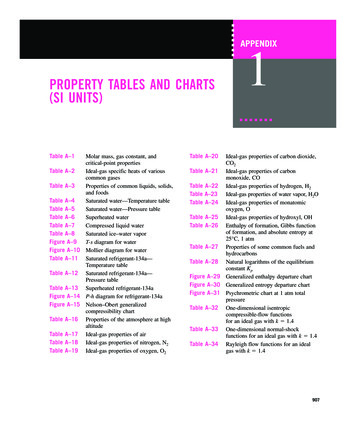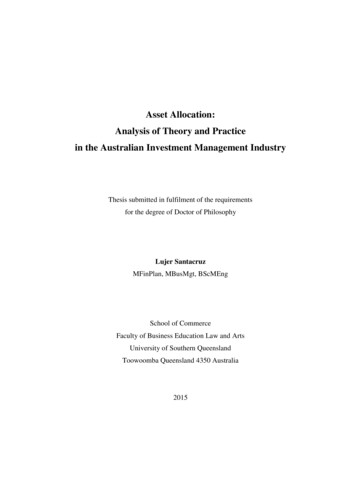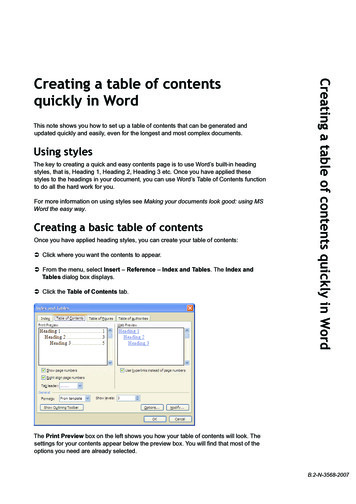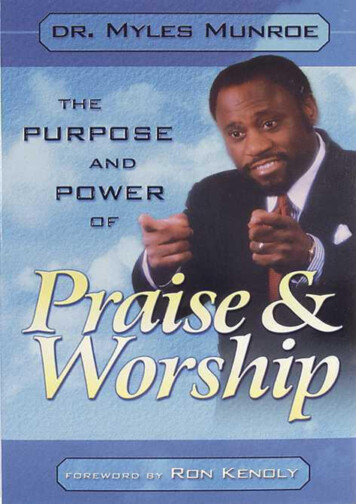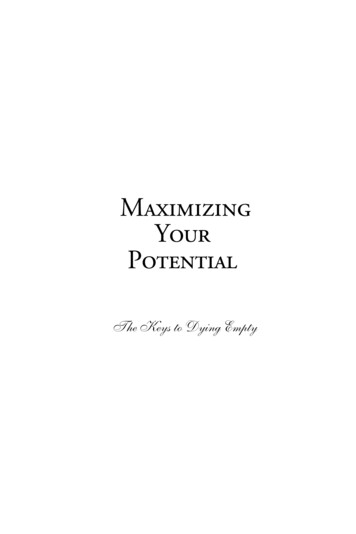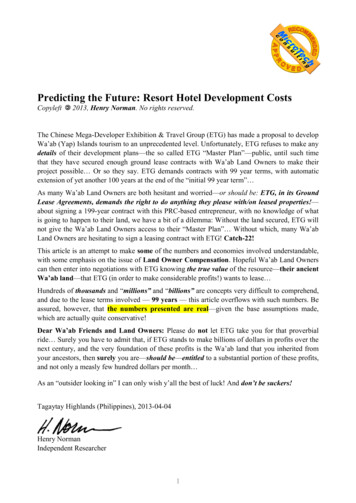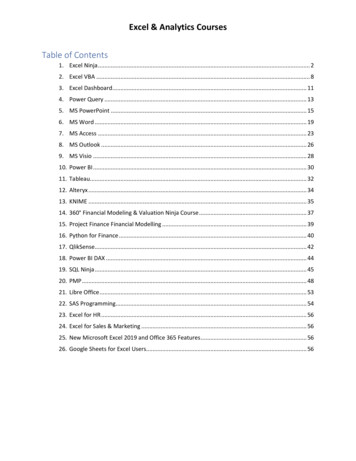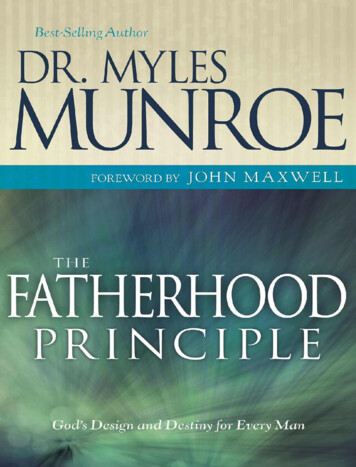
Transcription
Table of ContentsTitle PageCopyright uctionPart 1 - The Male’s Priority and Position1. The Purpose of Fatherhood2. The Male as Foundation and Anchor3. The Cornerstone of FatherhoodPart 2 - The Role of the Male: Ten Basic Functions ofFatherhood4. Father as Source and Progenitor5. Father as Sustainer, Nurturer, and Protector6. Father as Teacher7. Father as One Who Disciplines8. Father as Head and Leader9. Father as One Who Cares10. Father as DeveloperPart 3 - Fulfilling Your Purpose as a Father11. Understanding Purpose and Roles12. Fathering the FatherlessAbout the Author
Unless otherwise indicated, Scripture quotations are taken fromthe Holy Bible, New International Version , niv , 1973,1978, 1984 by the International Bible Society. Used bypermission of Zondervan. All rights reserved. Scripturequotations marked (kjv) are taken from the King James Versionof the Holy Bible. Scripture quotations marked (nasb) are takenfrom the updated New American Standard Bible , nasb , 1960, 1962, 1963, 1968, 1971, 1972, 1973, 1975, 1977, 1995 byThe Lockman Foundation. Used by permission.(www.Lockman.org) Some definitions of words are taken fromMerriam-Webster’s 11 th Collegiate Dictionary, s.v., “Anchor,”“Ancestor,” “Discipline,” “Husband,” “Progenitor,” “Train.”The Fatherhood Principle:Priority, Position, and the Role of the Male(Revised and Expanded Hardcover Edition of The Principle of Fatherhood) Dr.Myles Munroe Bahamas Faith Ministries International P.O. Box N9583Nassau, Bahamas e-mail: bfmadmin@bfmmm.com websites: www.bfmmm.com;www.bfmi.tv; www.mylesmunroe.tv ISBN: 978-1-60374-043-2
Ebook ISBN: 978-1-60374-773-8Printed in the United States of America 2000, 2008 by Dr. Myles MunroeWhitaker House 1030 Hunt Valley Circle New Kensington, PA 15068www.whitakerhouse.comLibrary of Congress Cataloging-in-Publication DataMunroe, Myles.The fatherhood principle : priority, position, and the role of the male / MylesMunroe. — Hardcover ed.p. cm.ISBN 978-1-60374-026-5 (trade hardcover : alk. paper) 1. Fatherhood—Religiousaspects—Christianity. I. Title.BV4529.17.M86 2008248.8'421—dc222008004765No part of this book may be reproduced or transmitted in any form or by any means, electronic ormechanical—including photocopy ing, recording, or by any information storage and retrieval sy stem—without permission in writing from the publisher. Pleasedirect y our inquiries to permissionseditor@whitakerhouse.com.This book has been digitally produced in a standard specification in order to ensure its availability.
DedicationTo all men everywhere, especially in Third World nations, whodesire to return to the original blueprint of true fatherhood.To my Dad, my beloved father, the Reverend Matthias E.Munroe, the greatest role model of fatherhood in my life—adistinguished man of character, strength, loyalty, commitment,love for my mother, and successful sustainer of eleven gratefuland grace-filled children. Thank you, Dad, for living thelessons of life that formed the foundation of the principles inthis book.To my late beloved brother, Paul, who became my twin in lifeand showed me how to love God without compromise. I knowyou are now with the Father of fathers.To my father-in-law, Captain Halton Lockhart, who fathered thewoman who has become the wife of my life. Thank you for yoursteady love and support and for being my other father.To my beloved son, Chario (Myles, Jr.), who makes me live upto the fatherhood image of God. May your sons also becometrue fathers in their generation.To my brothers, Oscar and Garth, may you continue to bemodels of the Father’s love for your wives and children.To all the members of the Bahamas Faith Ministries FellowshipReal Men Ministry. Thank you for allowing me to teach anddevelop these principles through your submission to theministry.To the born and unborn sons of men who neglected to showthem how to be fathers. May this book help father you to
become better fathers to your sons.
AcknowledgmentsEverything we accomplish in life is a synergistic product ofmany people who have contributed to what we have done andwho we have become. This work is no different. I am eternallygrateful to all the great men who have inspired, encouraged,and corrected me throughout my development over the years.It takes true fathers to produce true fathers.I want to thank the following people for their contribution tothe development and completion of this work:Dad, for laying the foundation for my life so that this bookcould be not just a theory, but a result of my living theprinciples you taught and lived before me all my life.My beloved wife, Ruth, and my precious children, Charisaand Chairo (Myles, Jr.), whose births made me a father andplaced demands on me to exemplify the principles of truefatherhood. Thank you for all your patience with me as Ideveloped as a husband and a father.The many spiritual fathers in my life whose lives andcharacter further refined mine: Dr. Oral Roberts; the late Dr.Tunel Nelson; Dr. Ezekiel Guti; Rev. Bob Stamps; Rev. DukeSmith; the late Dr. H. W. Brown; my oldest brother, OscarMunroe; my late brother, Paul Munroe; and my youngestbrother, Garth Munroe; my brothers-in-law, Henry Francis, JoseJohnson, Steve Hall, and Richard Pinder; and my father-in-law,Captain Halton Lockhart.
Finally, to the Father of our Lord Jesus Christ, the Creator andSustainer of all things, the ultimate Father of fathers, Elohim.
ForewordBeing a father is the most fulfilling job a man can have. AsChristian parents, we have the unique opportunity to make aneternal investment in the lives of our children.Jesus often referred to God as “Father.” God the Father givesunconditional love, leadership, and guidance. He protects andallows us to learn by His words. God has entrusted us with Hissacred title: Father.In the last few decades, society has strayed away from theimportance that fatherhood holds. We have seen the familyredefined so much that, in many cases, the father is not evenpresent. The traditional family is fading away, and, with it, weare losing God’s blessing and missing the mark.Becoming a good father is not automatic—it takes time andeffort. We must be willing to invest in this job—our mostimportant, second to being a husband—as any other career wemight pursue. A father should present the fundamentalqualities of leadership, responsibility, and accountability, aswell as the capabilities of planning, disciplining, and loving.Fathering is a full-time job. As men, we must train, develop, andlearn to be that which God intended for our families.In his book, The Fatherhood Principle, Dr. Myles Munroeprovides a fresh look at time-tested principles for men tomeasure their effectiveness as fathers in our modern society.Dr. Munroe teaches how the role, vision, relationship,
management, and communication skills of the father within thefamily structure apply to societies everywhere and at all levels.His fatherhood tips in each chapter challenge me to apply theirprinciples.In a time when there are classes, books, and workshops forevery skill and hobby, I would challenge every father to taketime to invest in his most important role—fatherhood. A goodfather is priceless, as are the children they lead and invest in.We need more good fathers, and this book is an invaluable toolthat will indeed help meet that need.—Dr. John C. MaxwellAuthor and SpeakerFounder, The INJOY Group
PrefaceDad is destiny.” The words sprang from the page in U.S.News & World Report1 and exploded in my mind like an atombomb. I could not believe what I was reading. Even moresurprising was the source of those words—seemingly takenright from the heart of one of my old seminar sessions. For overtwenty-five years, I have lectured, taught, and counseledthousands of individuals on the subjects of relationships,family development, and marriage. One of the greatestconcerns I have carried over these years is the male crisisfacing most of our communities. I have repeatedly stated andemphatically declared that the key to the restoration andpreservation of a sane and healthy society is the salvaging ofthe male, especially as a responsible father. But to find thosewords on the pages of one of our most popular newsmagazines was cause for great encouragement and excitement.I am a trainer in human and leadership development andfounded one of the most dynamic churches in Nassau,Bahamas. Therefore, it was a source of enormous comfort andrelief to see that contemporary behavioral scientists,psychologists, and government bodies were finally agreeingon a conclusion that many of us who deal with social andspiritual matters have known all along.The statement “Dad is destiny” embodies both the problemand the solution for the majority of our societies’ ills. In it liesthe key to the salvation and restoration of mankind. About
twenty-five hundred years ago, the biblical prophet Malachispoke of the work and purpose of the coming Messiah bydeclaring, “He will turn the hearts of the fathers to theirchildren, and the hearts of the children to their fathers”(Malachi 4:6). The implication is that the divine assessment ofman’s fundamental problem is that it is a fatherless problem.U.S.News & World Report stated that “more than virtuallyany other factor, a biological father’s presence in the family willdetermine a child’s success and happiness.” Without a doubt,this secular article read like a Sunday morning sermon takenfrom the books of the Bible. It was a refreshing reminder thatno matter how far we as a society may stray, it is impossible toeffectively ignore, deny, or improve on the ancient wisdom andfundamental truth and principles embedded in the biblicalrecords. The Bible establishes in its very first chapters thecritical and pivotal role of the male, as well as his fatherhoodresponsibility.Let’s take a brief reality check on the status of our modernday society and its impact on this and future generations:Rich or poor, white or black, the children of divorce and thoseborn outside marriage struggle through life at a measurabledisadvantage, according to a growing chorus of socialthinkers .[Many social scientists and behavioral experts] challenge theview that external forces like street crime, lousy schools andeconomic stress lie behind the crisis in families. The revisedthinking is that it’s the breakdown in families that feeds social
ills.2The National Fatherhood Initiative compiles information from avariety of sources on the effects of fatherlessness on manysocial problems, including poverty, maternal and child health,incarceration, crime, teen pregnancy, child abuse, drug andalcohol abuse, education, and childhood obesity. Here is someof the disturbing data they have collected:Children in father-absent homes are five timesmore likely to be poor.Infant mortality rates are 1.8 times higher forinfants of unmarried mothers than for marriedmothers.Youths in father-absent households still hadsignificantly higher odds of incarceration thanthose in mother-father families.Youths are more at risk of first substance usewithout a highly involved father.Being raised by a single mother raises the risk ofteen pregnancy.Fatherless children are twice as likely to drop outof school.Compared to living with both parents, living in a single-parenthome doubles the risk that a child will suffer physical,emotional, or educational neglect.3An absent father can have an effect on a person’s economic
prospects beyond childhood. According to a report by the U.S.Department of Labor, today’s fatherlessness may bode ill for tomorrow’s labor force, at least if thepredictions of economic theory are correct. In Becker’s(1981) model, for example, children raised in families withfewer resources tend to have lower human capital. Thuseconomic theory would predict that, all else equal, the nextgeneration of workers will enter the labor market with lesshuman capital than the last. 4Research has shown that even individuals who survive thetrauma and negative impact of a broken home or marriage stillsuffer socio-psychological maladjustments. The emotional,psychological, spiritual, and moral needs met by the loving,caring, balanced environment of a strong marriage and familyunit cannot be substituted.It is understandable that there are no perfect humanspecimens in the human race; however, social sciences haveconcluded that when an individual is incubated within anatmosphere of love, unity, and caring between two parentalelements, there is a definite transfer of those qualities andcharacteristics to the next generation. In essence, the humanfamily produces after its own kind. The natural, logical processof reproduction, which involves the intimate consummation oftwo individuals, gives evidence that the Creator designed thehuman family to procreate within the context of a strong, stableunion structured to provide the social, psychological,emotional, physical, and spiritual environment for successfuldevelopment.
There is further evidence that there are critical emotional andpsychological needs that only a male can provide, just as thereare specific needs only the female is designed to meet.Therefore, the absence of either has an effect on development,despite the seemingly normal functioning of the human family.The negative statistics of fatherlessness can be reversed bythe power of fathers restored to their place in the family andtheir true calling as men. We can reverse these downwardtrends and strengthen lives, families, communities, and nationsby discovering and living out the priority, position, and role ofthe male in the family.—Dr. Myles Munroe1 Joseph P. Shapiro, Joannie M. Schrof, Mike Tharp, andDorian Friedman, “Honor Thy Children,” U.S.News & WorldReport, February 27, 1995.2 Ibid.3 https://www.fatherhood.org/father factor.asp, February 6, 2008.
4 Jeff Grogger and Nick Ronan, “The Intergenerational Effectsof Fatherlessness on Educational Attainment and Entry-LevelWages,” September 1995, Bureau of Labor Statistics, U.S.Department of htm, February 6,2008.
IntroductionThe greatest enemy of man is ignorance of self. Nothing ismore frustrating than not knowing who you are or what to dowith what you have. It is debilitating to have something butnot know what it is for or how to use it. Even more frustratingis to have an assignment but not know how to fulfill it. Everhad that problem? As a student, did you ever take home anassignment and not know how to complete it but still try yourbest to do it all by yourself? Remember that feeling of sittingup all night, trying hard, failing, and finally getting angry witheveryone, including yourself? How terrible it is to be givensomething to do but not possess the understanding of how todo it. This is a cause of greatest distress.We Lack Understanding of OurselvesAll of mankind’s problems are a result of one major dilemma.What’s this dilemma? Possession without comprehension;assignment without instruction; resources without knowledge;having everything but not knowing why. Essentially, thedilemma is that we lack understanding. Without understanding,life is an experiment, and frustration is the reward.I’ll never forget bringing home my algebra homework fromjunior high school in the Bahamas, where I’ve lived all my life.Have you ever taken algebra? Remember all those formulas?For me, it was the most difficult subject in school. Somestudents had an aptitude for math, particularly algebra,
geometry, or calculus. I didn’t. Learning algebra was a horribleexperience for me.Understanding those many formulas was my problem. Iremember getting homework assignments consisting of sixproblems to solve per page. I would go home and just sit therestaring at those things. No matter what I did, since I did notunderstand the formulas, I could not solve the problems.I would become frustrated to the point of tears. I knew I wouldget punished in the morning if I didn’t understand the formulasand come up with the correct answers. What did I do? I fakedit! I wrote down whatever figures came to my mind. Havingsome numbers written on the page may have looked good, so Ithought, but all the answers were incorrect.This is more than just an interesting story. You see, when itcomes to the issues of life, we often do the same thing I didwith my algebra assignments. When problems arise, we don’tunderstand the problems, much less life itself, so we fake it.Although I tried to make the figures work out the way I wanted,they were wrong because I didn’t understand the formulas.When test time came, my lack of understanding brought me thefinal result of faking it—failure.One day I decided I had better learn and understand thoseformulas, so I took a tutoring course after school with myteacher. I put forth the time and effort, and even though it tookme hours, one by one, I began to understand the formulas!Every time I understood them, a lightbulb went off in my mind.Algebra finally made sense to me and eventually became easy.
The fear I had was now replaced with confidence.After I began understanding algebra, I took home myassignments with a smile. Before understanding algebra, I wenthome with fear. By overcoming my lack of understanding, I wasable to approach those problems with confidence.The minute you understand and learn the principles of how todo something, then no matter what figures are given to you,you’ll just plug them into the proper formula. The figures canchange any number of ways, but the formula remains the same.Understanding how to use the formula and how to plug thenumbers in correctly gives you the right answer.Principles are very much like formulas. They are set laws thatgovern life and are constant in the face of change. The key,then, is learning and understanding the principles so you canhandle any configuration, any problem, or any situation in life.When you understand the principles of life, it doesn’t matterwhat life throws at you—just plug the problem into theprinciple.The great challenge of life is understanding life. When lifethrows us a curve ball, we often just play games and fake it.Many times, we have to guess and then wonder endlessly ifour guesses will work.What we lack is understanding. David, the great king of Israel,addressed this very issue. By divine inspiration, he spoke ofthe moral and social chaos in his community and described theroot cause of mankind’s confusion, frustration, and selfdestruction: “They know nothing, they understand nothing.
They walk about in darkness; all the foundations of the earthare shaken” (Psalm 82:5).This text declares that the reason why the people of the earthare so confused and filled with problems is not because thereare no answers but because we don’t understand our Creator.We don’t know His principles, His purpose, His nature, or Hisprecepts.Three Things That Cause Problems in LifePsalm 82:5 identifies three progressive components that are thesource of our suffering in life. First, there is a lack of knowledge—“they know nothing.” Second, there is a misunderstandingor misconception of life—“they understand nothing” andcannot comprehend their environment. And third, there is alack of spiritual sight—“they walk about in darkness”; theysee nothing. The word “darkness” in the original Hebrewconnotes the principle of ignorance. In most cases, its useimplies the absence of knowledge. In this context, its usedenotes that men are ignorant or blind to God’s principles. Ifyou attempt to live and solve the challenges of life from aposition of ignorance, then you are walking in darkness andwill experience exasperation, frustration, and failure.The text concludes that the result of ignorance and a lack ofunderstanding is that “all the foundations of the earth areshaken.” Foundation implies the fundamental principles andlaws that regulate function or operation. In essence, whenpeople lack knowledge and understanding of the basic,fundamental laws of God, all life goes off track and ends in
failure.When you lack understanding, you will continually use thewrong formula. Knowledge, wisdom, and understanding, then,are vital keys to teaching the right answer.What Is Understanding?Here’s a simple definition of understanding: “Understanding isknowledge and comprehension of the original purpose andintent of a thing and of the principles by which a thing wasdesigned to function.”To possess understanding of something, you must know theoriginal intent for it. First, what was in the mind of the one whomade it? Second, how did the creator of a product intend it tofunction?Understanding is comprehension of the truth. Why is thisimportant? Because nothing is truly yours until youunderstand it. No matter how much you sit and listen, if youdon’t understand a thing, it’s still not yours. You will nevertruly own or possess a thing that you do not understand.That’s why information does not guarantee knowledge. JesusChrist, the greatest Teacher of all time, said, “He who has ears,let him hear” (Matthew 11:15). He was separating people whosimply listen to information from those who actuallyunderstand it. When you understand a thing, it becomesyours. Most of our lives are exercises in misunderstanding. Welive from the blind side, and for most of us, that encompassesall sides.
Let’s take this one step further: if you don’t understandyourself, you don’t yet possess yourself. That is why peoplewho don’t know who they are imitate other people and becomesomeone other than who they were created to be. If you don’tknow what you were born to be and do, then you become thevictim of other people’s opinions. Understanding who madeyou and who you are is crucial so that others do not takepossession of your life. When you have understanding, youknow what to do with your life.When I finally learned those algebraic formulas, I knew whatto do with any figure given to me. This principle is soimportant. Again, once you understand life, it doesn’t matterwhat life throws at you; you can work out the problem.In this book, we are going to learn the purpose, principles,and functions of fatherhood so that it doesn’t matter what thefacts of your life currently are. You will know, understand, andlearn how to recognize the qualities, character, and function ofa true father. Facts will always submit to principles whenprinciples show up. But if you have facts without principles,facts are going to control and frustrate your life.Life is complicated only to a man ignorant of principles, forprinciples are designed to simplify life. Principles arepermanent. Principles protect products. Principles preserve.Principles contain inherent judgment. Principles cannot bebroken; rather, you break yourself on them. Principles do notshow favoritism. Principles are independent of culture, race, orcreed. Principles are the principal thing, and obedience toprinciples guarantees success.
Part 1The Male’s Priority andPosition
Chapter 1The Purpose ofFatherhoodAkey theme that runs through all my books is that purpose isinherent in everything that has been created. I have spentthirty years studying the concepts of purpose and potential, aswell as counseling and guiding thousands of individuals to livelives of personal fulfillment and social and spiritual well-being.The knowledge and experience I have gained has led me to theconclusion that the central principle of life is purpose.Exploring the concept of purpose leads us to an understandingof all aspects of our lives. We see an illustration of this in theway purpose guides the development of products in thebusiness world. When a manufacturer creates a new product,the product’s intended use and purpose govern the design ofthat product.The priority of purpose has its origins in our Creator, and ithas signifcant practical applications for us as human beings.When our Creator made humanity, He designed men andwomen to fulfill their specific functions and gave them qualitiesand characteristics to enable them to perform His intendedpurpose. From an analysis of Scripture, we can see that Godcreated the male with a particular purpose in mind. He intendedmen to be fathers; therefore, He designed them to be so.
As we will see, “fatherhood” has a much broader meaningthan just the biological production of children. Fatherhood isnot a choice for a male but is inherent in his very nature. Theessence of the male is fatherhood. Every adult male is meant tobe a father, and his personal fulfillment is linked to living outthat purpose.Purpose is the source of all true fulfillment and defines one’sexistence. Without purpose, life ceases to be an existencebecomes a mere experiment. If men do not know, understand, orfulfill their God-given purpose, then problems will arise both intheir identity and their relationships.Let’s explore the implications of the principles of purposeand how they relate to the male’s purpose of fatherhood.The Principles of PurposePurpose is defined as the “original intent and reason” for thecreation of a thing. Through my exploration of this mostimportant issue, I have identified seven principles of purposeto assist you in better understanding the nature of life:God is a God of purpose.Everything in life has a purpose.Not every purpose is known by human beings.Where purpose is not known, abuse is inevitable.If you want to know the purpose of a thing, neverask the thing itself.Purpose is found only in the mind of the maker of
the thing.Purpose is the key to fulfillment.Many of the problems males face come from a lack ofunderstanding their own purpose in life. Principles one and twoassure you that you do have a purpose on this earth. Withoutan understanding of God’s purpose for you, however, you willabuse your life and, most likely, the lives of those around you.The solution is not to try to conjure up a purpose for yourselfbut to discover your Maker’s original intent for you, becauseyour purpose is found in the mind of your Maker. The greatnews is that discovering and living out that purpose is the keyto your fulfillment as a male, a son, a brother, a husband, afather, a member of your church, a citizen in your communityand nation, and a human being in the world.The Male’s PurposeWith these principles of purpose in mind, let us now turn ourattention to the concept of the “Fatherhood Principle” and howit relates to the male’s purpose.We have seen that everything was created to fulfill apurpose and was designed according to the demand of thatpurpose. The unique difference in design that distinguisheseach created thing from another is mandated and is critical tothe function it is expected to perform. In essence, the differencebetween the physical, mental, psychological, and dispositionalnature of the male and female is providential, essential,valuable, and necessary for the fulfillment of their particularpurposes in life. The nature of a thing is determined by its
purpose.I want to give you the purpose of fatherhood according tothe “Manufacturer’s Manual” (the Bible). Understanding thepurpose for the male is a critical and necessary step inunderstanding fatherhood, because the male was designated(design-ated) a father by the Creator. God was thinking “father”when He created man. As a matter of fact, buried in every boyis the potential of being a father. This means that God intendsevery boy to grow up into fatherhood. Again, I am not justtalking about the male’s biological ability to father offspring.Being a “father” is rooted in God’s image because God isFather. He is not satisfied until the father comes out of the boy.Fatherhood is the design and destiny of the male.What Is Father?We should begin with the meaning of father because one ofthe greatest dangers to society is the misconception of whatfatherhood is. Definitions determine interpretations; thus, wemust start here. In the Old Testament, the Hebrew word for“father” is ab. Abba, meaning “Daddy,” comes from this word.In the New Testament, the Greek word for father is pater. So,you have ab and abba in Old Testament Hebrew and pater inNew Testament Greek.What do ab and pater mean? These words denote very basicconcepts that include the following:SourceNourisher
SustainerSupporterFounderProtectorThe source of a thing is its ab or father. As the source, theab sustains and maintains. Another aspect of the meaning ofthe word father is “upholder.” Father is the source thatupholds everything that comes from it.There are some other English words related to ab and paterthat describe fatherhood and are absolutely essential to thepurpose of a father. Don’t skim over the following words; theyare loaded with meaning:ProgenitorThis term comes from the Latin meaning “to beget forth.” Italso denotes “precurser” or “originator.” A father is theinitiator or source. Generations come from the ab and pater—the father—not the mother. God created man to be father—theprogenitor, source, and supporter of generations. The abgenerates everything. That’s why there is no seed in women;the male is designed as progenitor.Ancestor. Ab also refers to ancestor.5 The English wordsancestor and ancestry ultimately come from the same Latinverb antecedere, meaning “to go before” or “precede.” At thestart of an ancestral line is the father. He begins the heritage forall his seed. This is very important. The man (father) was given
the responsibility not only to start and provide the futuregeneration, but also to give that generation an identity.For example, when a child is born, it normally takes itsfather’s last name, not its mother’s name. When you use bothnames, you are attempting to claim and produce twogenerations and two identities instead of one. This causesmuch confusion in the offspring.In Scripture, there is no such thing as the son of two fathers.God always speaks of lineage to one man—the father. James,the son of Zebedee, was Zebedee’s son, not the son
Mar 07, 1983 · principles you taught and lived before me all my life. My beloved wife, Ruth, and my precious children, Charisa and Chairo (Myles, Jr.), whose births made me a father and placed demands on me to exemplify the principles of true fatherhood. Thank you for all your p

